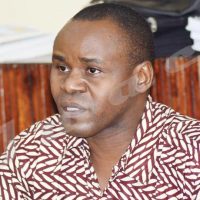
Gabriel Rufyiri, OLUCOME Chairman on the left and Gilbert Bécaud Njangwa, ONELOP Chairman on the right
The Centre for Fight against Corruption and Economic Embezzlement in Burundi-OLUCOME and the Coalition of Burundian Civil Society Organizations-ONELOP say they are against the limitation of terms for non-profit associations.
“Some leaders of non-profit associations wish to be at the head of their organizations forever and ever”, says Pascal Barandagiye, the Interior minister, while presenting the bill on term limit for non-profit associations in the National Assembly.
Gabriel Rufyiri, OLUCOME chairman says the government is taking advantage of the crisis to pass controversial laws to the parliament.
As for the limitation of terms [not exceeding 5years], Gabriel Rufyiri says it is not enough. «Olucome is not against the law on term limits, but 5years are not enough. The term should at least be extended to 10 years”, he says.
«The term limit itself does not matter provided that the law is also applicable to other state institutions “, Rufyiri says.
According to Gilbert Bécaud Njangwa, ONELOP chairman, the term limit law should not be applied to non-profit associations. “I think the five-year term refers to that of Burundian Constitution. However, that concerns only presidents not all institutions”, Njangwa says.
“What should be better is to allow members of those non-profit associations elect their representatives. Then, if they judge necessary to elect one person four or five times, nothing matters”, says Njangwa.
The bill approved unanimously by MPs on 28 December says members of the Executive Committee shall be elected by the General Assembly for a term determined by the statutes, not exceeding five years.
The old law on the organic framework of non-profit associations was made with a text that no longer corresponds to the current development of modern societies and the preoccupations of the moment, says Pascal Barandagiye, emphasizing the importance of the new law.


















 IWACU Open Data
IWACU Open Data

